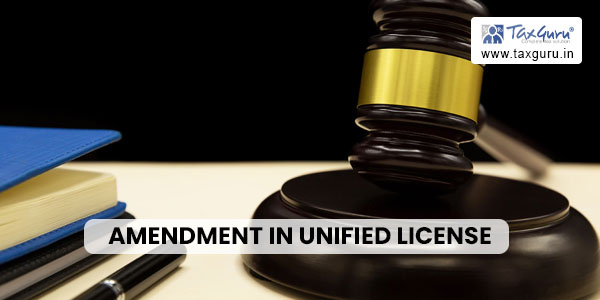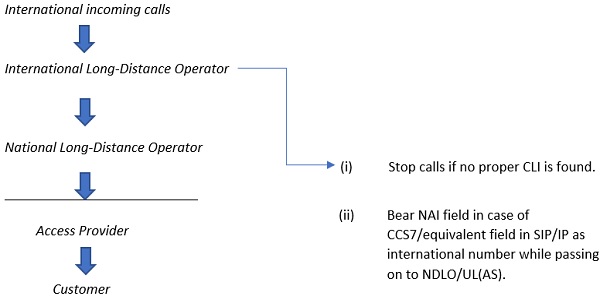Discover the amendment to Unified License (ILDO) addressing CLI spoofing by the Department of Telecom (DoT) effective from 1 August 2022. Explore the impact on ILD operators, the perspective from consumers, operators, and the author. Learn how the amendment enhances security and filters international spam calls, protecting Indian consumers. Analyze the compliance challenges and recurring costs for telecom operators to safeguard consumers from scams and ensure network security.
The Department of Telecom (DoT) on 6 July 2022 notified an amendment to Part II, Chapter XI, Clause 6.5 of the Unified License (UL) relating to International Long Distance (ILD) service, in order to address the menace of CLI spoofing. The amendment been stated to be effective from 1 August 2022.
Broadly, the amendment revises the earlier ‘security conditions’ under Clause 6.5 to insert certain additional obligations on the ILD operators regarding identification of international calls.
Table A below sets out the original and amended provisions, for reference.
Table A | Amendment
|
Existing Clause |
Amended Clause |
| PART-II, CHAPTER-XI, INTERNATIONAL LONG DISTANCE SERVICE | PART-II, CHAPTER-XI, INTERNATIONAL LONG DISTANCE SERVICE |
| 6. Security Conditions: | 6. Security Conditions: |
| 6.5 The Licensee shall transit the CLI as received from the foreign callers. In case CLI is not received from the distant end (foreign party) then the ILD operator in the country shall introduce his assigned two-digit carrier identification code followed by the country code from where the call is received. In no case, the call shall be offered to BS0 / CMTS / UASL /UL(AS)/UL (with access service authorization) Licensee without any CLI. This is to identify the origin of call and ILD operator handling the call. |
6.5 All International Long Distance Operators (ILD0s) should drop all calls with no CLI or improper CLI at their Gateways and should ensure that all calls handed over by ILD0s to National Long Distance Operators (NLD0s)/ Access Service Providers, should bear “Nature of Address Indicator (NAI)” field in case of CCS7/equivalent field in SIP/IP as “International Number”. For identifying an improper CLI, ITU-T recommendations on E.164 numbering scheme may be referred. |
Original Provision
The original provision prohibited ILD operators from passing any calls to domestic operators without any ‘call line identification’ (i.e., CLI). If any calls originate outside the country but without proper CLI, the ILD operators must introduce their assigned 2-digit carrier identification code, followed by the country code from where the call originated, before passing on the call to the national telecom service provider. This was done to identify the country from which the call originated, and the ILD operator that handled the call[1].
Amended Provision
The revised provision, however, seems to have done away with the above requirement of the ILD operators adding their own 2-digit carrier identification code. Instead, the following obligations have been added.
(1) The ILD operators must drop any calls with no or improper CLI. This is to be identified and verified at the ILD gateways.
(2) For identifying improper CLIs, the ILD operators are advised to refer to the ITUT recommendations on the E.164 number scheme (which is available here, along with relevant amendments and supplements till date)[2].
(3) When handing over the calls to national long distance (NLD) operators or access services providers, the ILD operators must ensure that the ‘nature of address indicator’ (NAI) field – within the CCS7 or equivalent field in SIP / IP – should depict the origin as an “international number”.

CCS7 (or the Common Channel Signalling System no. 7) is a system / process of transferring information over a distance to control the setup, holding, charging, and releasing of connections in a communication network[3]. It is a common signalling system where instead of signalling being associated with each traffic channel, a common signalling channel is used for all circuits [4].
Nature of address indicator (NAI) as suggested in the above amendment, is a field within the CCS7 signalling protocol. According to European Telecommunications Standards Institute (ETSI), for identifying national and international calls: (i) if the country code of the Gateway and the next node is located in the same country, then it is a national number, else an international number[5].
Identification by ILDOs. It seems that under the amendment ILD operators are allowed to refer to the numbering format under E.164, and ITU recommendations in this regard, for identifying an improper CLI which will enable them to drop those calls that mismatch with the E.164 format.
TRAI has explained the above process in the flowchart below[6] (with author’s additions).

Observations
1. Consumer perspective.
(a) International spam calls pose a security threat as many of them turn out to be scams devised to pilfer credit card information, personal information from unsuspecting users. The said amendment will push and assist operators in filtering calls in a stringent manner[7].
(b) Many news articles have stated that the move should be implemented smoothly, and the time frame is fair[8]. This move will up the security of Indian consumers who can potentially be scammed by international callers with no proper CLI[9].
2. Operator perspective.
(a) Telecom operators will have to analyse the infrastructure (hardware / software) cost of this compliance.
(b) The locations at which such infrastructure costs will have to be incurred towards this compliance, may also have to considered.
(c) The operators will also have to evaluate the plausibility of completing this compliance withing the suggested timeline of 1 August 2022.
(d) In case of any non-compliance including non-adherence to the timeline, since the amendment does not impose a specific monetary liability, it can be assumed that the general liability provision under the license will apply (under which the DoT may impose exemplary liability for each instance of breach).
3. Author’s perspective. Technology is everchanging and intruders / offenders are always one step ahead in determining the know-how of technology and subverting identification. Therefore, the above compliance will likely be a recurring cost for the telecom operators in order to protect the consumers.*
[1] https://economictimes.indiatimes.com/industry/telecom/telecom-news/dot-directs-that-no-international-calls-with-proper-caller-id-should-reach-users/articleshow/92696010.cms
[2] The ITUT recommendations, Annexure B, Section B.7, states: “Calling/connected line identity (CLI/COLI) is address information that is passed across the network to provide supplementary services such as calling (or connected) line identification presentation. The format of the CLI and COLI for international calls should be the full international ITU-T E.164-number, i.e., country code (CC), national destination code (NDC) and subscriber number (SN). No other information, such as prefixes or symbols (e.g., “+”), should be included, although a sub-address may be associated with the CLI/COLI. However, in a country where network-specific numbers are utilized for identifying customers or network services, it remains a national matter. When implemented, the NPI (numbering plan identifier) TON (type of number) mechanism should define the numbering status of the calling/connected line. The authorization to pass CLI/COLI across an international boundary is a national matter.”
[3] http://what-when-how.com/roaming-in-wireless-networks/signalingan-introduction-ccs7-in-wireless-networks/
[4] https://silo.tips/download/overview-of-ccs7-signalling
[5] “If CC encoded in the URI is equal to the CC of the country where MGCF is located AND the next BICC/ISUP node is located in the same country then set to “national (significant) number” else set to “international number”.
[6] https://www.trai.gov.in/sites/default/files/CP_IUC_08112019.pdf
[7] https://www.medianama.com/2022/07/223-dot-wants-international-call-identification/
[8] https://www.communicationstoday.co.in/dot-announces-new-rule-for-international-calls/
[9] https://telecomtalk.info/dot-announces-new-rule-for-international-calls/533600/



